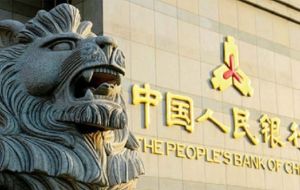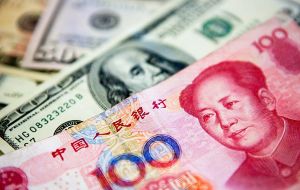MercoPress. South Atlantic News Agency
China devalues the currency in support of its struggling export sector
 The People's Bank of China surprised the market on Tuesday weakening the fix on its daily reference rate for the Yuan by a record 1.9%.
The People's Bank of China surprised the market on Tuesday weakening the fix on its daily reference rate for the Yuan by a record 1.9%.  The People's Bank of China surprised the market on Tuesday weakening the fix on its daily reference rate for the Yuan by a record 1.9%.
The People's Bank of China surprised the market on Tuesday weakening the fix on its daily reference rate for the Yuan by a record 1.9%. China has moved aggressively to devalue its currency in a bid to support its struggling export sector as the economy shows further signs of weakness on the way to reporting its slowest annual pace of growth in 25 years. The People's Bank of China surprised the market on Tuesday weakening the fix on its daily reference rate for the Yuan by a record 1.9%.
The central bank fixes the currency at a certain level against the US dollar every morning, allowing investors to trade the currency within a 2% band.
The move follows a worrying trade report released on the weekend, which showed exports fell 8.3% in July compared to a year earlier.
In a brief statement the Chinese central bank said that “for the purpose of enhancing the market-orientation and benchmark status of central parity, the PBC has decided to improve quotation of the central parity of RMB against US dollar.
”Effective from 11 August 2015,the quotes of central parity that market makers report to the CFETS daily before market opens should refer to the closing rate of the inter-bank foreign exchange market on the previous day, in conjunction with demand and supply condition in the foreign exchange market and exchange rate movement of the major currencies”.
The central bank has already cut interest rates four times over the past year and lowered lenders' reserve requirements to boost economic activity.
The move to weaken the currency is likely to anger the United States, which in the past has accused China of keeping the Yuan artificially low to support its export sector. However in July, the International Monetary Fund said the Yuan was no longer undervalued although it needed to be more flexible.
China's Yuan dropped by 1.2% to 6.2848 in early trade in Shanghai and also fell by in Hong Kong's offshore trading.
The bank also justified the latest decision by arguing that currently the international economic and financial conditions are very complex. The U.S. economy is recovering and markets are expecting at least one interest rate hike by the FOMC this year. As such, the U.S. dollar is strengthening, while the Euro and Japanese Yen are weakening. Emerging market and commodities currencies are facing downward pressure, and we are seeing increasing volatilities in international capital flow.
This complex situation is posing new challenges. As China is maintaining a relatively large trade surplus, RMB’s real effective exchange rate is relatively strong, which is not entirely consistent with market expectation. Therefore, it is a good time to improve quotation of the RMB central parity to make it more consistent with the needs of market development.




Top Comments
Disclaimer & comment rules-

-

-

Read all commentsdevalue its currency
Aug 11th, 2015 - 09:56 am 0Cracks are showing, leaks are abound ,
and seepage can be seen through the holes,
but will she come back from the brink.
The little boy and the dike.
Aug 11th, 2015 - 10:41 am 0@2 Captain Poppy
Aug 11th, 2015 - 10:47 am 0The problem for China though is that there are too many cracks and the little boy only has 10 fingers.
Eventually the dam will burst, and they'll no longer be able to prop up the Yuan against the US dollar, leading to a massive devaluation.
But that's economics for you, and trying to enforce an exchange rate because of politcial reasons has never worked. Market forces, like nature itself, always brings it back into balance.
Commenting for this story is now closed.
If you have a Facebook account, become a fan and comment on our Facebook Page!